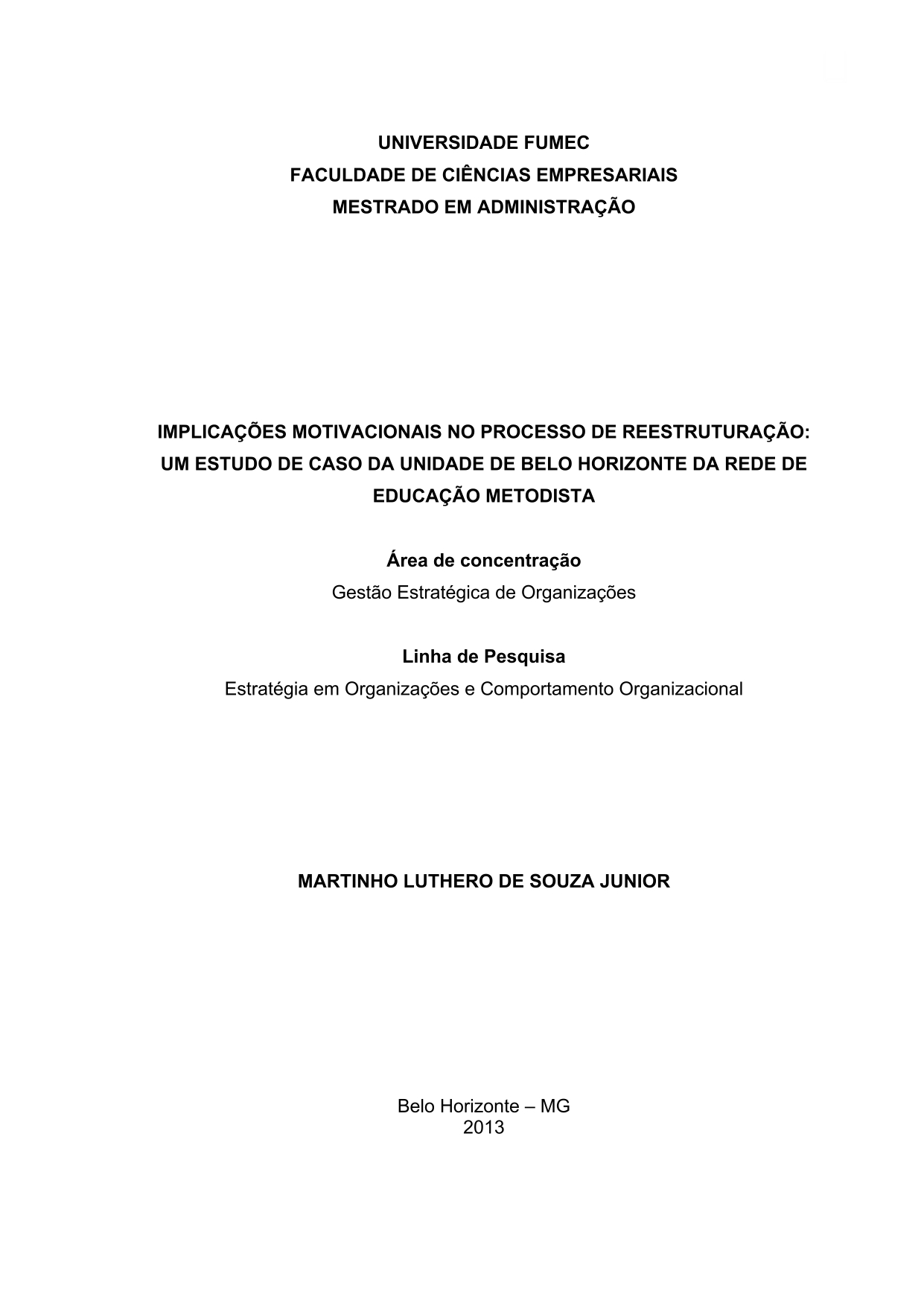Implicações motivacionais no processo de reestruturação: um estudo de caso da unidade de belo horizonte da rede de educação metodista

Visualizar/
Data
2013Autor
Souza Junior, Martinho Luthero de
xmlui.mirage2.itemSummaryView.MetaData
Mostrar registro completoResumo
As constantes crises econômicas, oriundas de fatores macroambientais, e também a necessidade de se adequar à nova dinâmica do mercado, competitivo e veloz, geram a urgência das mudanças chamadas de reestruturação organizacional. Seja pela adaptação, seja pela necessidade gerada por falhas e erros de gestão, o sucesso da reestruturação deve-se muitas vezes à sua forma de condução. A sustentabilidade e a recolocação no mercado são resultados do processo no qual a organização se baseou para as tomadas de decisões. No meio desse processo, estão as pessoas, vivendo as fases, envolvendo-se emocionalmente e pessoalmente em todas as etapas. Nesse sentido, a variável motivação (disposição para se fazer algo) tem papel estratégico dentro da organização. A crise chegou também para as instituições de ensino superior do país. Nesse sentido, a presente pesquisa procurou investigar as implicações motivacionais no processo de reestruturação de uma instituição conectada à Rede Metodista de Educação, por meio de entrevistas semiestruturadas com personagens diretamente envolvidos nesse processo. Inicialmente, foi feita uma pesquisa bibliográfica sobre os conceitos de motivação e reestruturação. Posteriormente, no roteiro de entrevistas, foram inseridos fatores motivacionais que poderiam ser identificados como característicos do resultado do processo de reestruturação, para que fosse possível captar os sentimentos e a subjetividade nele envolvidos. Ao se investigar a influência dos fatores motivacionais no processo de reestruturação, chegou-se à conclusão de que ele precisa ser bem planejado e cuidadoso, para que as pessoas não sejam afetadas, ao ponto de perder sua motivação, interesse, empenho e produtividade no desenvolvimento de suas tarefas. Constant economic crises originated from macro environmental factors and also the call for adaptation to dynamics of the new, competitive and fast market, generate the need of organizational restructuring. The success of a restructuring depends on the way it is conducted, either if its reason is the need to adapt or the correction of management flaws. The sustainability and market replacement are results of the process in which the Organization relied for decision-making. In the middle of this process there are people living the phases and engaging emotionally and personally at all stages. In this way, the motivation variable (the will to do something) has a strategic role within the organization. The crisis has also reached higher education institutions in Brazil. Accordingly, this research sought to investigate the motivational implications in the restructuring process of an institution connected to the Methodist Education Network, through semi-structured interviews with subjects directly involved in this process. At first, it was made a bibliographic research on the concepts of motivation and restructuring. Then, it was inserted, in the interviews’ script, motivational factors that could be identified as characteristic of the result of the restructuring process so that it would be possible to capture the feelings and the subjectivity involved in this process. By investigating the influence of motivational factors in the process of restructuring, the conclusion was that this process needs to be carefully planned, so that people are not so affected to the point of losing their motivation, interest, commitment and productivity in developing their tasks.
